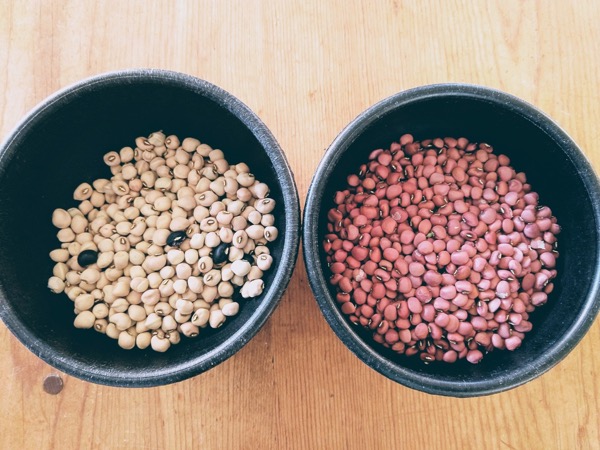Gifts from the earth
 October 8, 2020
October 8, 2020 
Birgit planted cowpeas at the community garden this year—Bisbee Red from Tucson's Native Seed Search and Mississippi Purple, a relative of black eyed peas. Cowpeas—or "crowder peas" as some varieties are called for the way they are packed in their pods—grow well in the kiln known as "summer" here. Last week we harvested a big pail of both kinds, and I have been eating the fresh shelled cowpeas stewed in olive oil and herbs, and shelling the dried seeds for storage.
Last night I had a little time after dinner and was shelling a bag of the dried beans. The touch of their smooth, round bodies on my fingers as I sorted the seeds from their brittle pods (mostly by feel) slowed my heart rate, calmed my mind. A kind of inner quiet descended—the first of a full day of tasks—and for those few minutes I was just there with the elemental reality of seeds and food and fall.
Every one of these seeds
is a poem
from the plant to the earth
waiting for the sun to open it up
and for the rain
to read it.
It is still hitting 100 here most days—leading us to dub the month "Hotober"—but fall has definitely arrived. The nights are dropping into the 50's, the angle of the solar oven clearly shows the lower path of the sun, and there are no more afternoon thunderstorms. It is calmer and quieter, and it just smells different, feels different.
This settling, this winding down, is so different from the social picture right now—the human struggle. And that struggle also needs our attention, our engagement, our caring. But the seeds help—their curved bodies cool against my fingers—and the way the seasons hold all of our anxiety like something so ephemeral it could blow away in an instant.
The past four months of studying about racism in the U.S. have helped, too. I have paid so little attention to history before, thinking of it as something past that didn't apply to me now. But if systems tend to continue—just as the sprout from this seed continues to grow into the same kind of plant—history is less like a train traveling from Seattle to St. Louis and more like the nested Russian dolls in which each contains inside it a replica of itself.
For example, it has been hard for me to understand where the currents of white supremacy that are so visible now come from. I grew up thinking that this was a radical, minority position. But as I read the history of the founding of this country, white supremacy was the norm, and was codified into our political structures. Who could own land, who could vote, who was deemed a "person" were all based on race, with the white race at the top. Often the major controversy wasn't whether whites were "superior" or not, but rather, who got to be "white." Even European immigrants from Ireland and Italy, for example, were not considered "white" for a time.
Consider this.
In 1860, Senator Jefferson Davis from Mississippi argued before the Senate “This Government was not founded by negroes nor for negroes,” he said, but “by white men for white men.” That is what I would expect from a soon-to-be Confederate state, but you can find the same sentiment in the north.
in 1858, Abraham Lincoln was running for the Senate seat from Illinois against incumbent Stephen Douglas. In the debates leading up to the election, much of the talk was about race and slavery, with Douglas saying things like, America “was made by white men, for the benefit of white men and their posterity forever,” and even Lincoln responding to attacks with: “'I am not nor ever have been in favor of making [Black people] voters or jurors,' or politicians or marriage partners... 'There is a physical difference between the white and black races which I believe will for ever forbid the two races living together on terms of social and political equality. And inasmuch as they cannot live, while they do remain together there must be the position of superior and inferior, and I as much as any other man am in favor of having the superior position assigned to the white race.'”(1)
This is just one example, and when I see more clearly this thread of our history, I no longer feel surprised at white supremicism—even in myself. It is the air we breath, and it makes sense of my own subtle assumptions, ways that I, like Lincoln, also unconsciously prefer that the "superior position be assigned to the white race." Rather than spending my energy being surprised or outraged at the narrowness of the white-focused world view, I want to simply see it and do something different.
As I wrote this post, I learned that cowpeas were relevant to this topic in ways I didn't realize. They were brought to this hemisphere from Africa on slave ships selling African captives in Jamaica, then introduced to Florida in the early 18th century where they became a major crop on plantations in the south. At some point they were brought to the southwest and became part of the agriculture of the Tohono O'odham people whose land used to encompass the area where I live now. Cowpeas have fed people of all colors—in their misery and in their need and in their joyful celebrations; they link us all together in unseen, but fundamental ways.
So I am grateful to the cowpeas not only for their solid reality, and for the quiet they bring that allows me to find my own real center, but for the way they connect us all. This is the ground from which change can grow.
-------------------------
(1) Quotes are from Ibram X. Kendi, Stamped from the Beginning, PublicAffairs, Kindle Version, p. 205-209.